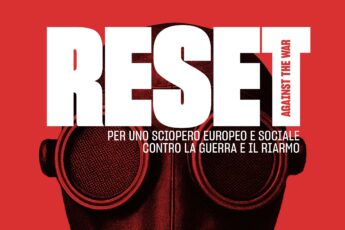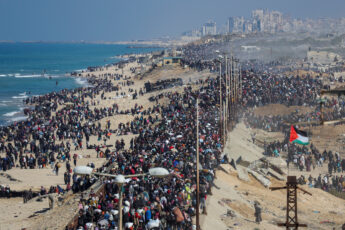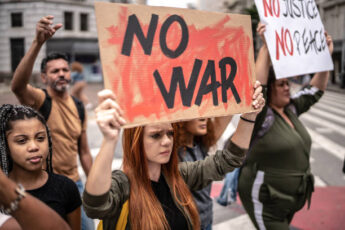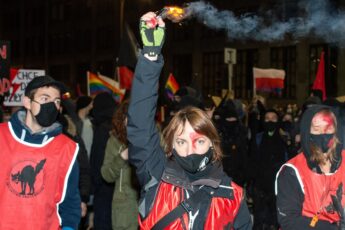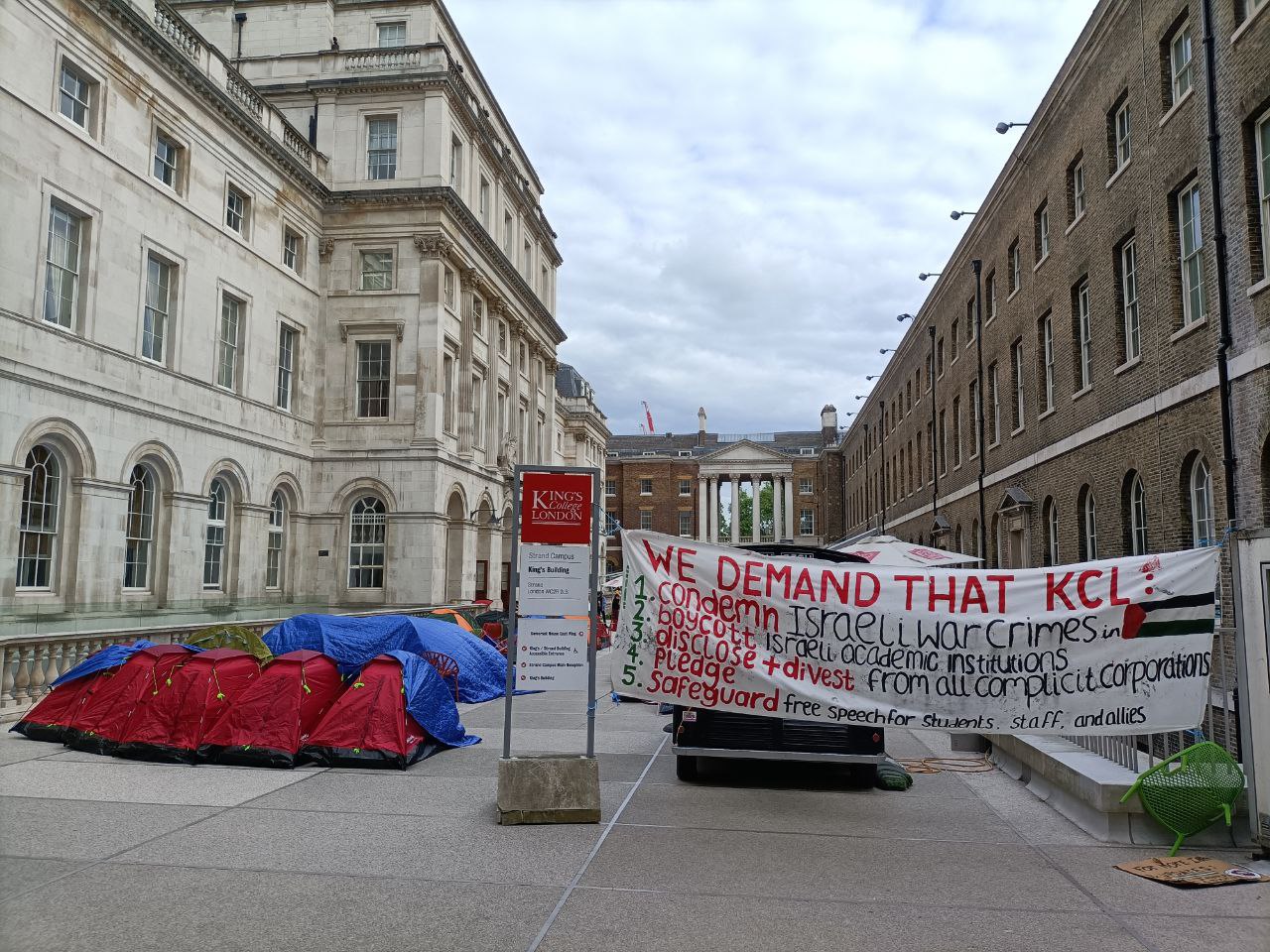
Following the first encampments in the US (read our interviews from the University of North Carolina and City University of New York), protests against the genocide in Gaza have also spread to Europe and several UK campuses in the past few weeks. Recently, in London, King’s College London (KCL), Queen Mary University, and the London School of Economics have followed the first encampments at University College London and SOAS and the occupation of Goldsmith. Here we publish an interview with Luqmaan, who is part of KCL Stands for Justice, realized on Thursday, May 16th, just a few days after the start of the encampment. Luqmaan describes the demands made to the university administration and the mixed composition of encampment participants in the context of growing militarism in the UK, where public spending is being cut to be reinvested in military expenditure and migrants are being threatened with deportation to Rwanda. Luqmaan highlights the link between the war and the new racist laws against migrants and the need to build communication between the social movements opposing them. In this sense, the student protests for Palestine could be “the first domino for change,” taking on a broader meaning for all those who are affected by the worsening of living, studying, and working conditions due to the war.
TSS: Can you tell us how the encampment started here at KCL and what your demands are?
Luqmaan: Within London, the first encampment began at UCL, and King’s students collaborated and supported that encampment. But over time, we realized that for the demands they will make directly to their university, there is much more potency to make the same demands here. The collective that contributed and supported the encampment at UCL then set about organizing here, and on Monday 13th, we launched our encampment in the courtyard at Strand Campus and immediately set forward our five demands. Number one, King’s College London has to condemn the Israeli war crimes that have been occurring in Gaza for the past seven months. When Russia invaded Ukraine, the university put out a statement condemning the act within a few days. When Hamas attacked Israel, the university condemned the attack within a few days. But after seven months of atrocity after atrocity, the university has not seen fit to criticize a single thing, even though all the universities in Gaza have been destroyed. As an educational institution, do you not think that this university would have a minimal duty to condemn the perpetrators of the destruction without there being any valid reason? Let’s forget about the genocide, the mass ethnic cleansing, the destruction of the health care system, and the killing of journalists. Even on the academic level, there is no condemnation.
Number two, this university needs to boycott all Israeli institutions that have been complicit in the occupation and the ongoing ethnic cleansing within Palestine. Number three, divestment. But before divestment, this university needs to actually declare what investments they have in Israel, specifically in complicit companies. We know from what’s on paper that there are at least £700,000 investments in individual companies that are complicit. However, we know that the universities across London have much larger investments that are hard to separate. The university must declare, and then we will move towards divesting from those companies.
Number four, because of the destruction of the education system in Palestine, this university has a minimal duty to assist in the rebuilding of the education sector in Gaza and provide scholarships for Palestinian students. We demand at least two scholarships named in honor of Dr. Maisara Al-Rayyes, one of the students here who was murdered with his entire family in Gaza in November, and Dr. Adnan Al-Bursh, who did his fellowship at King’s Hospital and was serving at Al-Shifa Hospital, but rather than leaving Gaza, he went back to the North to conduct more surgery. Israel abducted him in November, tortured him for five months, and we recently found out that he passed away. King’s College London did not even condemn it. So, rebuilding the education sector and naming two scholarships in their name. And number five, we demand that the university protect and safeguard our right to protest peacefully, without any fear, without any threat of whatever violence or reprisals.
TSS: What kind of reaction did you have from the university management, and what do you expect in the next few days?
Luqmaan: We chose a courtyard that is typically open to the public so that everyone can come in through the gate. The university immediately sought to shut down the square. They’re much stricter on who gets in and out. They actually scan cards and check your ID with your face, so it’s been fully tracked. We get daily notices for one thing or another, like saying that we’re not allowed to use loudspeakers, and there’s an entire list of warnings. What we are seeing is a very gentle approach in which they tighten the screw every single day. On Wednesday 15th, we invited doctor Azam Tamimi, and he had to speak from outside because he was not permitted to come inside. They’re not trying to use any shock tactic as they did at Columbia, where they just brought in mass forces to beat everyone, which, they realized to their detriment, actually propels more people to join the cause.
TSS: As you were saying, encampments and other student protests spread all over the UK and London in particular. You already told us about KCL students’ participation in the encampment at UCL, are you now interested in building linkages with other campuses? Is there some kind of communication going on?
Luqmaan: We derive so much of our hope from the universities that have divested, such as Trinity College Dublin and even Goldsmiths’s slightly tenuous situation, despite being in London, about whether they’ll actually go ahead with what they’re doing. Because one reaction of the universities can just be to say, okay, we’ll do something to respond to your demands. Then, the students disperse and go away over the summer, and they never implement those things anyway. So, communication with other universities has to be 100%. If you look, students’ demands from other encampments are fundamentally the same. But across London, a coalition could be useful also because there are University of London investments that then transcend just single campuses. There is a joint fund of UCL, Queen Mary, King’s, and all the other constituents and universities. So, we are beginning to think about forming coalitions with other universities here in London, and we are also suggesting to have a three-way conversation between Columbia University, a university in the Netherlands, and King’s. We have a joint call and try to benefit from not just the advice, but also see how we can actually work together.
I think the biggest challenge right now for any encampment is how to unify and form a coalition of all the individual people who, while coming for a united passion for Gaza, do represent different factions within society and the student body. There are all King’s College students here and across the spectrum – the undergraduates, graduate, and postgraduate students. We’ve been having conversations and discussions and teach-outs and the cross-section of perspective that comes from students from Physics and Engineering, which I thought was the most apolitical of subjects. All these people come at that same location, but how do we keep them there over the month on the message on brand? I think that’s definitely where that cross-communication will help, not just within the camp but across London. This could all be individual encampments towards that greater cause. And being that first domino, that knocking over that first domino, which is going to cause change across London, the UK, and hopefully the world as well.
TSS: Since we are talking about the broader context, in these weeks there have been other important social struggles going on in the UK related to recent political developments, like the anti-raid groups against the passing of the Rwanda Bill, which seems to have been favored by the war climate. Do you plan to connect with these other struggles? Do you frame yourselves as an antiracist movement?
Luqmaan: I think the fact that we’re involved in this thing means that we were disillusioned a very long time ago about this society and how it portrays race and race relations. But I think this struggle, perhaps more than any, laid completely bare the hypocrisy of the European liberal system which pontificated to the high heavens about Russia’s invasion of Ukraine and its emphasis on freedom and liberty and standing on the side of the oppressed. I think more than before, it’s become utterly evident who is on what side of history at the moment. I think other liberation struggles will know what side of the equation they fall upon in that divide. And then there has to be a coalition forming between those struggles to know that concerning the issue of Rwanda, the same people who are perpetuating it are utterly, completely linked with that same Zionist movement that is perpetuating what’s happening in Israel. And so often you find when you go to many of these protests once we deal with Gaza, someone then talks about how to stop deportations. And many of them do end up going. So, I think while we want to stay on brand on Gaza for the time being and achieve the aims that we have, we must recognize that the same players that are perpetuating the suffering on both sides and how we, by toppling down one, basically might be able to topple down all of them because the forces that we are.
TSS: While adding to a long history of violence, the current genocide in Gaza is part of a broader and escalating war scenario that involves Ukraine and Europe as well, so that as Permanent Assembly Against the War, we have spoken of a Third World War. What do you think can be the role of students in opposing this war scenario?
Luqmaan: Our immediate aim is to get the university to divest, so I haven’t been thinking about whether this could stop world war. But as soon as the war in Gaza started, the immediate worry was that if groups within Lebanon got involved, and then Iran, Russia, and China, that could quickly spiral into World War III, if it isn’t already here. We’re looking at nuclear fallout. The call for a ceasefire, the call for a stop, however incremental and however small within a university setting, expanding into a national and hopefully international level, can lead to a stop to a further escalation of what is happening in Gaza that could stop the outbreak of World War III proper. So, the connection is, you know, a fully zoomed-out one. I don’t think that the students involved in these protests would be a very small part of it. I was speaking to Norman Finkelstein, the Jewish American professor, who said not to overestimate what we are doing here. But he said cynically, or possibly pragmatically, that even if you end up saving just one life, it’ll be completely worth it. So even if we save one life or we circumvent World War III, it’s all worth it. This is why we are here.


